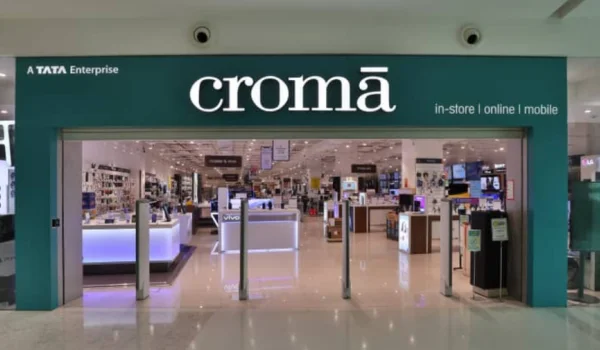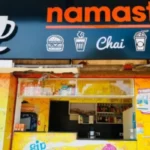Croma—part of Tata Group’s Infiniti Retail—sits at the top of India’s electronics retail space, operating over 550 stores across 200+ cities as of mid‑2025. Its reputation for wide product choice, service support (like ZipCare), and Tata-backed credibility make it a compelling franchise option for those looking to enter electronics retail.
💰 Investment Overview & Cost Breakdown
⚙️ Estimated Capital Requirements
While Croma does not publish official franchise charges, multiple experts estimate:
- Franchise Fee: ₹40 lakh
- Capital Investment (capex): ₹2.24 crore (fit-out, interiors, setup)
- Inventory Deposit: ₹1.75 crore
- Security Deposit / Rent Advance: ₹25–40 lakh
- Maintenance / Consulting Charges: ₹10 lakh (5-year term)
- Other Costs (marketing/misc): ₹12 lakh
➡️ Total Estimated Investment: ₹4.5–5.5 crore for a 5,000–10,000 sq.ft outlet.
Industry portals likewise show an overall infrastructure investment ranging from ₹5 crore to ₹10 crore, with ₹50 lakh franchise fee being common.
Break-even is typically achieved within 3–5 years, with Return on Capital Employed (ROCE) of ~18–20% by year 3.
📊 Franchise Investment Table

| Component | Estimated Cost |
| Minimum Space Required | 5,000–10,000 sq.ft |
| Franchise Fee | ₹40 lakh |
| Capex (Fit-out + Interiors) | ₹2.24 crore |
| Inventory Advance | ₹1.75 crore |
| Security Deposit (Refundable) | ₹25–40 lakh |
| Maintenance Charges (5 yrs) | ₹10 lakh |
| Miscellaneous | ₹12 lakh |
| Total Investment | ~₹4.5–5.5 crore |
| Revenue Share to Franchisor | 5.5% (<₹30 Cr sales), 3% (₹30–40 Cr), 1–1.5% (>₹40 Cr) |
| Expected ROCE | 18–20% (from year 3) |
| Payback Period | ~3–5 years |
🏗 Franchise Model & Support Structure
Franchise Model: FOCO
Croma operates under a FOCO model (Franchise‑Owned, Company‑Operated)—investors fund the store setup, while Tata handles day-to-day operations including staffing, inventory, and marketing. This model suits investors who prefer passive income rather than active retail operations.
Corporate Support
Franchisees benefit from:
- Site evaluation and location recommendations
- Store design and layout guidelines aligned with Croma brand standards
- Vendor contracts for fixtures and other essentials
- Training, marketing support, warranty programs (ZIPCare), and inventory planning support
- Operational dashboards and weekly reporting to monitor performance
📈 Financial Outlook: Margins & ROI Potential
Revenue Sharing & Profit Scenarios
Revenue share is tiered:
- Up to ₹30 crore annual sales: 5.5% to Croma
- ₹30–40 crore: 3%
- Above ₹40 crore: ~1–1.5%
Example: ₹24 crore annual sales × 5.5% = ₹1.32 crore revenue share in Year 1. Deduct rent (~₹96 lakh annually) to get net profit ~₹36 lakh—translating to ~8% ROI in leased land; owning property improves this up to ~25–40% ROI.
As sales grow in subsequent years, ROCE improves to ~18–20% from year 3 through economies of scale and lower revenue shares.
✅ Eligibility Criteria & Ideal Profile
Croma typically looks for:
- Minimum age: 25 years
- Business-oriented individuals or corporate entities with sound financial capability
- Experience in electronics or retail fields
- Prime property ownership or lease: 5,000–10,000 sq.ft in malls, city centres, or high visibility zones
- Geographic fit: Outlets should be within 250 km of Croma’s warehouse; metro population ≥3 lakh; area coverage planned based on demand scope.
Exclusive territory rights are granted to franchisees, and agreements typically run 15 to 21 years, with renewal fees around ₹40 lakh after each 5-year term.
📝 Steps to Apply for Croma Franchise
- Visit Croma’s official franchise webpage and fill out enquiry form with your personal, business, and investment details.
- Initial screening: Croma evaluates your background, investment readiness, and proposed site.
- Site feasibility visit: Croma assesses location for accessibility and customer catchment potential.
- Agreement signing & payments: Franchise fee + deposit paid; legal contract finalised.
- Store build-out: Fit-out, fixture installation, interiors aligned with brand design.
- Operations handover: Tata staff manage setup; training provided by corporate team.
- Go Live & Reporting: Weekly sales, margins and operational KPIs reported; ongoing support from Croma operational team.
⚖️ Pros & Cons of Investing in Croma
✅ Advantages
- Strong Tata brand equity ensures consumer trust and traffic
- Established supply chain, inventory systems, and marketing infrastructure
- Significant passive income model under FOCO franchise setup
- Long-term investment model with high predictability in ROI
❌ Considerations
- High capital requirement—₹4.5–5 crore minimum limits accessibility to high-net-worth investors
- Payback period of 3–5 years—requires long-term commitment
- Consumer reviews highlight concerns: Reddit threads mention inconsistent after-sales service experiences from Croma (e.g. AC returns, warranty issues).
- Market saturation risk: Electronics retail is increasingly competitive; location and execution matter
💡 Expert Tips Before You Invest
- Visit existing Croma stores, check footfall, demo layout, engagement, product range.
- Talk to current franchise investors or past ones about real ROI, contractual experience, and operating issues.
- Check rent escalation clauses and ensure rent-to-sales ratio remains sustainable.
- Clarify revenue-share tiers and renewal fees in agreement to plan long-term profitability.
- Keep financial buffer for minimum 3–6 months before streamline profits emerge.
- Review exit/renewal terms carefully prior to signing multi-year contract.
✅ Quick Franchisee Reference Table
| Feature | Details |
| Space Required | 5,000–10,000 sq.ft |
| Total Investment | ₹4.5–5.5 crore |
| Franchise Fee | ₹40 lakh |
| Revenue Share (Franchisor) | 5.5% (<₹30 Cr), sliding down to ~1% |
| Ownership Model | FOCO (Company-operated) |
| Payback Period | ~3–5 years |
| ROCE | ~8–16% initially; 18–20% by Year 3 |
| Agreement Tenure | 15–21 years (renewable) |
| Ideal for | Long‑term investors with deep capital |
🎯 Final Take
Investing in a Croma franchise offers a prestigious and scalable entry into India’s electronics retail market under a globally respected Tata brand. Although capital-heavy, the FOCO model enables passive income with structured operations and professional franchise support. Long-term returns of 18–20% ROCE are realistic, provided strong location choice and stable consumer demand.

Shashi Kant is the Founder and Editor of BusinessScroller.com, a leading platform for business insights, finance trends, and industry analysis. With a passion for journalism and expertise in business reporting, he curates well-researched content on market strategies, startups, and corporate success stories. His vision is to provide valuable information that empowers entrepreneurs and professionals. Under his leadership, BusinessScroller.com has grown into a trusted source for in-depth articles, customer care guides, and financial expertise.


